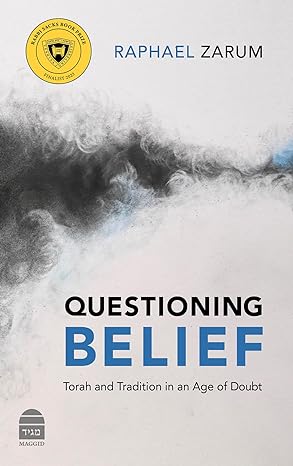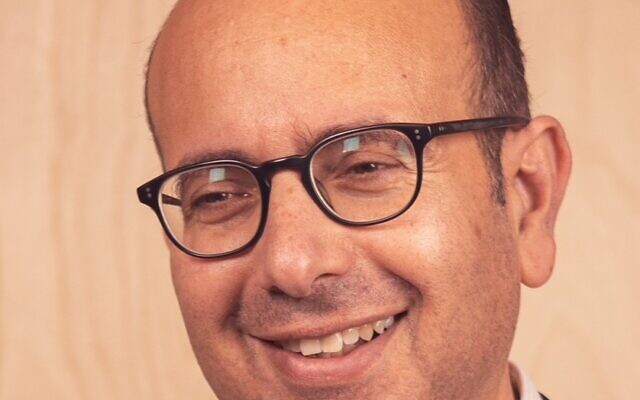Book elevates the concept of broiges to a whole new level
Jewish adults need better explanations of why we do what we do in Judaism, says Rabbi Zarum
Jenni Frazer is a freelance journalist
As has often been remarked upon, we Jews love to argue. It can be over something trifling or something important: but a broiges is a broiges, right? Occasionally a broiges is something to be treasured, and I think that Rabbi Dr Raphael Zarum, dean of the London School of Jewish Studies, wishes more of us would indulge.
That, at any rate, is part of the message in Rabbi Zarum’s new and groundbreaking book, Questioning Belief, Torah and Tradition in An Age of Doubt, in which he elevates broiges to a whole new level. This is not a run-of-the-mill argument, but a passionate and forensic examination of the arguments that Jews have with Judaism. Why do we do this or that? Much of Jewish practice is illogical, explained away to children as “just because”.
But Jewish adults need better explanations. As Rabbi Zarum observes in his introduction to Questioning Belief, “there is a risk in mistaking the Jewish tradition for a vast supercomputer. Press a button and a specific, timeless answer to any question just pops out”.
Over the course of 12 fascinating chapters, Rabbi Zarum unpicks the most common questions about Jewish life in the wake of modern scientific discoveries, and endeavours to provide intelligent answers. Was the Flood real, people ask, or the Exodus story? What has Judaism to say about slavery, or collective punishment? (Clue: we don’t approve of either.)
And in the five years it took him to write this book, Rabbi Zarum concludes that “in the end, my thinking moved me from a defence of Judaism to a re-evaluation of it for the modern age”. The question, he says, is “did the re-evaluation change Judaism, or change you?” He says that the re-evaluation changed him: as someone from a scientific background – his PhD is in physics – who would usually require detailed proofs, he gently pushes the reader to acknow-ledge that not everything in the Torah is meant to be taken literally.
Many of the stories in the Torah are, says Rabbi Zarum, morality tales to “teach human responsibility for the world”. And “context is key: the rabbis say you mustn’t take the Torah literally. The line that the strictly Orthodox rabbis say should not be taken literally is ‘an eye for an eye and a tooth for a tooth’. So the question then is, what’s literal and what’s not literal.”
Who is this book aimed at? “I’ve tried to be what I call ‘middlebrow’. There’s ‘highbrow’, which is for academics, very intellectual, very hard to read, and everything justified on the highest level. There’s ‘lowbrow’, which is not fully grounded – it’s lovely stories but it’s not quite honest about the complexities of Torah. I’ve tried to steer a middle level – to admit the difficulties in Torah, try to answer them, but make it relevant to people”. So Questioning Belief is as likely to throw in a glancing reference to the Beatles as it is to supreme exponents of Torah commentary.
 His audience, he says, is “mainstream educated people, who want to live a meaningful Jewish life but can’t let go – correctly so – of their rational understanding of the way the world is. They want to believe, but they find it difficult”.
His audience, he says, is “mainstream educated people, who want to live a meaningful Jewish life but can’t let go – correctly so – of their rational understanding of the way the world is. They want to believe, but they find it difficult”.
His principle, he says, was that “if God made the world, and God made the Torah, they can’t contradict. So I would look for an answer. And what I found were many halfway, or apologetic answers… so I looked for deeper answers”.
Rabbi Zarum is aware that still, in some communities, questions are positively discouraged. But, he says, learning with the late Rabbi Sacks, (whose daughter Gila provides a thoughtful foreword to the book), was like “a breath of fresh air” and that he and his contemporaries were encouraged to ask questions wherever they could.
Of his own upbringing, he says: “My father was a Yemenite Jew and he knew the Bible by heart. He never looked over his shoulder at people from Gateshead or Stamford Hill. My cousins on my mother’s side were from Stamford Hill. We’d go to simchas, they’d be wearing black hats and coats and my father would be in a modern suit. They would talk to him and he’d be quoting Bible verses by heart – it was an equal conversation. So I grew up never thinking ‘they’re better’ – I just thought, ‘they’re different’.”
One of the most painful and frequently-raised issues is that of God and the Holocaust: how it could have happened, why prayer did not seem to have any discernible effect. “Yes,” says Rabbi Zarum, pouncing on the point, “this comes under the heading of ‘arguing with God’ – God doesn’t want us just to accept things, he wants us to fight back.”
With some charm, he cites the story of a Chasid who approached his rabbi to say: “I don’t understand. How could God, who is perfect, create a world which has all these terrible things in it? And the rabbi says, it’s a good point. Do you think you could do better? The shocked pupil stammers, I could try. And the rabbi says, go! Make it better! Now, from a rational point of view, and my science training, that’s not an answer. But it is a way to live. That’s the Jewish answer: that God wants us to argue and rally against the immorality of humanity, and to make good.”
Even today, with the horrors of the Hamas attacks and the Israeli response, which has led to global condemnation, Rabbi Zarum still believes that Jewish ethics and values have an effect on the world stage. “We are not the only ones, but we are part of the consciousness of the world. I am, in fact, more worried for the West than for the Jewish people right now. We’ve got a covenant with God and we’ve been around for thousands of years. We’ve been through a lot of these things and we seem to have survived every time. I’m fairly confident of our survival. But I’m worried about the deep issues because we are too often the canary in the coal mine”.
Intriguingly, Rabbi Zarum cites Rav Kook (Rabbi Abraham Isaac Kook, the first Ashkenazi chief rabbi of British Mandate Palestine, and one of the founding fathers of religious Zionism), when he observes: “Doubters are more concerned with their doubts, than believers are with their beliefs. Rav Kook might say that the desire to study a work about questioning beliefs implies that you are eager to reflect on your relationship with God, and that this could lead to a renewed and heightened faith.”
I leave the London School of Jewish Studies imagining which prominent atheist would benefit from reading this book – and smiling at the thought.
Questioning Belief: Torah and Tradition in an Age of Doubt is published by LSJS and Maggid Books, £22.99

Thank you for helping to make Jewish News the leading source of news and opinion for the UK Jewish community. Today we're asking for your invaluable help to continue putting our community first in everything we do.
For as little as £5 a month you can help sustain the vital work we do in celebrating and standing up for Jewish life in Britain.
Jewish News holds our community together and keeps us connected. Like a synagogue, it’s where people turn to feel part of something bigger. It also proudly shows the rest of Britain the vibrancy and rich culture of modern Jewish life.
You can make a quick and easy one-off or monthly contribution of £5, £10, £20 or any other sum you’re comfortable with.
100% of your donation will help us continue celebrating our community, in all its dynamic diversity...
Engaging
Being a community platform means so much more than producing a newspaper and website. One of our proudest roles is media partnering with our invaluable charities to amplify the outstanding work they do to help us all.
Celebrating
There’s no shortage of oys in the world but Jewish News takes every opportunity to celebrate the joys too, through projects like Night of Heroes, 40 Under 40 and other compelling countdowns that make the community kvell with pride.
Pioneering
In the first collaboration between media outlets from different faiths, Jewish News worked with British Muslim TV and Church Times to produce a list of young activists leading the way on interfaith understanding.
Campaigning
Royal Mail issued a stamp honouring Holocaust hero Sir Nicholas Winton after a Jewish News campaign attracted more than 100,000 backers. Jewish Newsalso produces special editions of the paper highlighting pressing issues including mental health and Holocaust remembrance.
Easy access
In an age when news is readily accessible, Jewish News provides high-quality content free online and offline, removing any financial barriers to connecting people.
Voice of our community to wider society
The Jewish News team regularly appears on TV, radio and on the pages of the national press to comment on stories about the Jewish community. Easy access to the paper on the streets of London also means Jewish News provides an invaluable window into the community for the country at large.
We hope you agree all this is worth preserving.






















